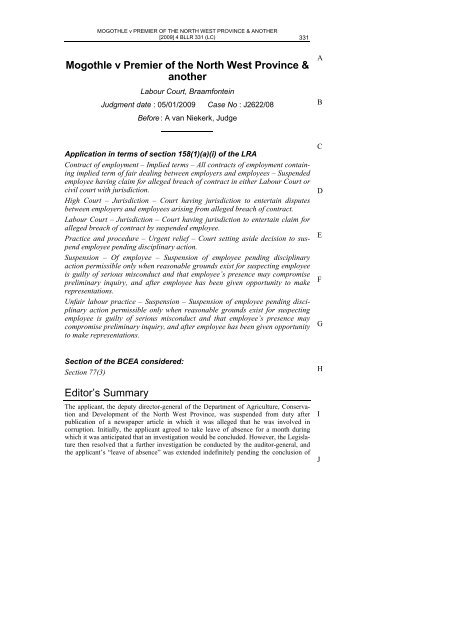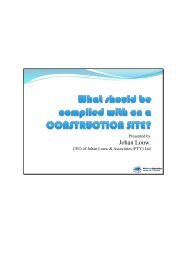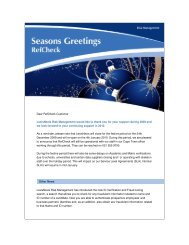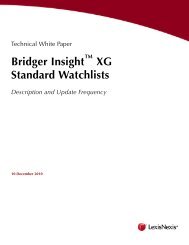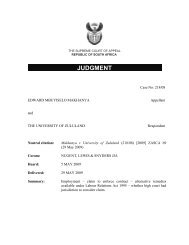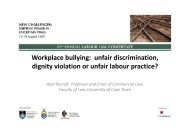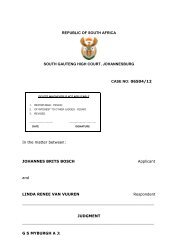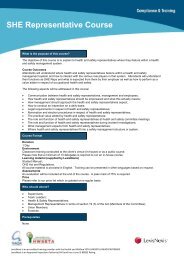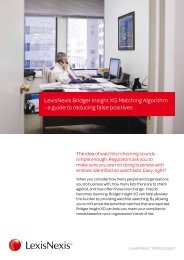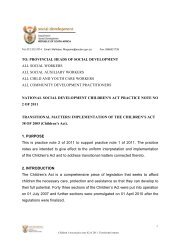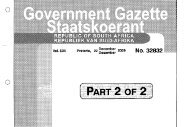Mogothle v Premier of the Northwest Province and others
Mogothle v Premier of the Northwest Province and others
Mogothle v Premier of the Northwest Province and others
You also want an ePaper? Increase the reach of your titles
YUMPU automatically turns print PDFs into web optimized ePapers that Google loves.
MOGOTHLE v PREMIER OF THE NORTH WEST PROVINCE & ANOTHER[2009] 4 BLLR 331 (LC) 331<strong>Mogothle</strong> v <strong>Premier</strong> <strong>of</strong> <strong>the</strong> North West <strong>Province</strong> &ano<strong>the</strong>rLabour Court, BraamfonteinJudgment date : 05/01/2009 Case No : J2622/08Before : A van Niekerk, JudgeABApplication in terms <strong>of</strong> section 158(1)(a)(i) <strong>of</strong> <strong>the</strong> LRAContract <strong>of</strong> employment – Implied terms – All contracts <strong>of</strong> employment containingimplied term <strong>of</strong> fair dealing between employers <strong>and</strong> employees – Suspendedemployee having claim for alleged breach <strong>of</strong> contract in ei<strong>the</strong>r Labour Court orcivil court with jurisdiction.High Court – Jurisdiction – Court having jurisdiction to entertain disputesbetween employers <strong>and</strong> employees arising from alleged breach <strong>of</strong> contract.Labour Court – Jurisdiction – Court having jurisdiction to entertain claim foralleged breach <strong>of</strong> contract by suspended employee.Practice <strong>and</strong> procedure – Urgent relief – Court setting aside decision to suspendemployee pending disciplinary action.Suspension – Of employee – Suspension <strong>of</strong> employee pending disciplinaryaction permissible only when reasonable grounds exist for suspecting employeeis guilty <strong>of</strong> serious misconduct <strong>and</strong> that employee’s presence may compromisepreliminary inquiry, <strong>and</strong> after employee has been given opportunity to makerepresentations.Unfair labour practice – Suspension – Suspension <strong>of</strong> employee pending disciplinaryaction permissible only when reasonable grounds exist for suspectingemployee is guilty <strong>of</strong> serious misconduct <strong>and</strong> that employee’s presence maycompromise preliminary inquiry, <strong>and</strong> after employee has been given opportunityto make representations.CDEFGSection <strong>of</strong> <strong>the</strong> BCEA considered:Section 77(3)Editor’s SummaryThe applicant, <strong>the</strong> deputy director-general <strong>of</strong> <strong>the</strong> Department <strong>of</strong> Agriculture, Conservation<strong>and</strong> Development <strong>of</strong> <strong>the</strong> North West <strong>Province</strong>, was suspended from duty afterpublication <strong>of</strong> a newspaper article in which it was alleged that he was involved incorruption. Initially, <strong>the</strong> applicant agreed to take leave <strong>of</strong> absence for a month duringwhich it was anticipated that an investigation would be concluded. However, <strong>the</strong> Legislature<strong>the</strong>n resolved that a fur<strong>the</strong>r investigation be conducted by <strong>the</strong> auditor-general, <strong>and</strong><strong>the</strong> applicant’s “leave <strong>of</strong> absence” was extended indefinitely pending <strong>the</strong> conclusion <strong>of</strong>HIJ
MOGOTHLE v PREMIER OF THE NORTH WEST PROVINCE & ANOTHER332 [2009] 4 BLLR 331 (LC)Athat investigation. The applicant <strong>the</strong>n launched an urgent application, contending that hehad been unlawfully suspended because he had not been afforded a hearing before hisBCDEFGHIJ
MOGOTHLE v PREMIER OF THE NORTH WEST PROVINCE & ANOTHER[2009] 4 BLLR 331 (LC) 333suspension was extended. His action was based on an alleged breach <strong>of</strong> contract, allegedfailure by <strong>the</strong> respondents to comply with <strong>the</strong> provisions <strong>of</strong> <strong>the</strong> disciplinary code formanagers in <strong>the</strong> public service, <strong>and</strong> an alleged violation <strong>of</strong> his rights under <strong>the</strong> Promotion<strong>of</strong> Administrative Justice Act 3 <strong>of</strong> 2000 (“PAJA”). The respondent argued that <strong>the</strong> matterwas not urgent, that <strong>the</strong> Court lacked jurisdiction to entertain <strong>the</strong> matter <strong>and</strong> that, in anyevent, <strong>the</strong> applicant’s enforced “leave <strong>of</strong> absence” was lawful.The Court observed that <strong>the</strong> judgment in Chirwa v Transnet Ltd & o<strong>the</strong>rs [2008] 2BLLR 97 (CC) cast considerable doubt on whe<strong>the</strong>r <strong>the</strong> applicant could claim relief under<strong>the</strong> PAJA. However, <strong>the</strong> Court declined to rule on that point, since it sufficed to consideronly whe<strong>the</strong>r <strong>the</strong> Labour Court had jurisdiction to entertain <strong>the</strong> applicant’s claim undercontract. The Court noted in this regard that in three recent judgments, <strong>the</strong> SupremeCourt <strong>of</strong> Appeal has emphasised <strong>the</strong> mutual relationship <strong>of</strong> trust <strong>and</strong> confidence imposedby <strong>the</strong> common law contract <strong>of</strong> employment (see Old Mutual Life Assurance Co SA Ltd vGumbi [2007] 8 BLLR 699 (SCA); Boxer Superstores Mthatha & ano<strong>the</strong>r v Mbenya[2007] 8 BLLR 693 (SCA); <strong>and</strong> Murray v Minister <strong>of</strong> Defence [2008] 6 BLLR 513(SCA)). Although <strong>the</strong> development <strong>of</strong> <strong>the</strong> element <strong>of</strong> fairness in <strong>the</strong> common law contract<strong>of</strong> employment was controversial, <strong>the</strong> SCA had unequivocally established a contractualright to fair dealing which binds all employers <strong>and</strong> confers on all employees a rightto enforce that right, which exists independently <strong>of</strong> statutory protection against unfairdismissal <strong>and</strong> unfair labour practice. The Court held that, in <strong>the</strong> absence <strong>of</strong> any higherauthority to <strong>the</strong> contrary, it was obliged to follow <strong>the</strong> SCA judgments.The Court noted fur<strong>the</strong>r that <strong>the</strong> respondent had argued that on a “broad reading”, <strong>the</strong>Chirwa judgment had impliedly overruled <strong>the</strong> SCA judgments. On that point, <strong>the</strong> Courtnoted that <strong>the</strong> Chirwa judgment could be read on two levels. Narrowly construed, <strong>the</strong>judgment dealt only with whe<strong>the</strong>r <strong>the</strong> High Court had jurisdiction to entertain claims bydismissed public servants. At a more general level, <strong>the</strong> Chirwa judgment suggests that allemployment-related disputes involving allegations <strong>of</strong> unfair conduct by employersshould be decided in <strong>the</strong> dispute resolution forums established under <strong>the</strong> Labour RelationsAct 66 <strong>of</strong> 1995 (“<strong>the</strong> LRA”). The latter reading would mean that, in <strong>the</strong> light <strong>of</strong>Chirwa, any remedy established by <strong>the</strong> LRA must be pursued to <strong>the</strong> exclusion <strong>of</strong> anyright that may previously have existed. However, although <strong>the</strong> Chirwa judgment constitutesan obvious endorsement <strong>of</strong> <strong>the</strong> mechanisms, institutions <strong>and</strong> remedies created by<strong>the</strong> LRA, <strong>the</strong> judgment did not expressly exclude <strong>the</strong> right <strong>of</strong> employees to pursuecontractual claims ei<strong>the</strong>r in <strong>the</strong> Labour Court by virtue <strong>of</strong> <strong>the</strong> provisions <strong>of</strong> <strong>the</strong> BasicConditions <strong>of</strong> Employment Act 75 <strong>of</strong> 1997 (“<strong>the</strong> BCEA”) or in a civil court with <strong>the</strong>requisite jurisdiction. If <strong>the</strong> Constitutional Court wished to override three judgments <strong>of</strong><strong>the</strong> SCA, it would have done so in express terms.The Court held fur<strong>the</strong>r that <strong>the</strong> concurrent jurisdiction <strong>of</strong> <strong>the</strong> Labour Court <strong>and</strong> <strong>the</strong>civil courts in matters concerning contracts <strong>of</strong> employment did not conflict with <strong>the</strong>policy considerations expressed in Chirwa. The BCEA, enacted two years after <strong>the</strong> LRA,was also <strong>the</strong> product <strong>of</strong> negotiation between <strong>the</strong> social partners. By enacting section77(3) <strong>of</strong> <strong>the</strong> BCEA, <strong>the</strong> drafters acknowledged that disputes concerning contracts <strong>of</strong>employment had not been eclipsed by <strong>the</strong> LRA. Any problems that might be created by<strong>the</strong> concurrent jurisdiction <strong>of</strong> <strong>the</strong> Labour Court <strong>and</strong> civil courts in disputes concerningcontracts <strong>of</strong> employment would be for <strong>the</strong> Legislature to resolve.Turning to <strong>the</strong> merits, <strong>the</strong> Court noted that <strong>the</strong> suspension <strong>of</strong> an employee pending aninquiry into alleged misconduct is equivalent to an arrest, <strong>and</strong> should <strong>the</strong>refore be usedonly when <strong>the</strong>re is a reasonable apprehension that <strong>the</strong> employee will interfere withinvestigations or pose some o<strong>the</strong>r threat. The Court noted that <strong>the</strong>re have been twoapproaches to “preventive” suspension – one holding that a hearing before suspensionwas not necessary, <strong>the</strong> o<strong>the</strong>r holding that it is. The second approach is consistent with fairdealing in <strong>the</strong> employment context. This requires that an employee should not be suspendedunless <strong>the</strong>re are prima facie grounds for believing that <strong>the</strong> employee has committedserious misconduct <strong>and</strong> <strong>the</strong>re is some objectively justifiable reason for excluding <strong>the</strong>ABCDEFGHIJ
MOGOTHLE v PREMIER OF THE NORTH WEST PROVINCE & ANOTHER334 [2009] 4 BLLR 331 (LC)ABCDemployee from <strong>the</strong> workplace, <strong>and</strong> unless <strong>the</strong> employee has been given an opportunity tomake representations, albeit not <strong>of</strong> <strong>the</strong> kind required by <strong>the</strong> “criminal justice” model <strong>of</strong>workplace disciplinary action.The Court held fur<strong>the</strong>r that <strong>the</strong> evidence suggested that <strong>the</strong> MEC responsible for taking<strong>the</strong> decision to suspend <strong>the</strong> applicant had merely followed <strong>the</strong> behest <strong>of</strong> <strong>the</strong> Legislature.This was unfair because, as <strong>the</strong> executing <strong>of</strong>ficer, <strong>the</strong> MEC should himself have tried tobalance <strong>the</strong> wishes <strong>of</strong> <strong>the</strong> Legislature with <strong>the</strong> applicant’s interests. Fur<strong>the</strong>rmore, <strong>the</strong>rewas no indication on <strong>the</strong> papers that <strong>the</strong> applicant’s presence in <strong>the</strong> workplace wouldjeopardise <strong>the</strong> investigations. It was common cause that <strong>the</strong> applicant had not beenafforded a hearing <strong>of</strong> any kind before his suspension. The applicant’s suspension wasaccordingly unfair <strong>and</strong>, as such, breached <strong>the</strong> applicant’s contractual right to be treatedfairly. The Court accordingly had jurisdiction to entertain <strong>the</strong> application.As to <strong>the</strong> requirements <strong>of</strong> urgency, <strong>the</strong> Court noted that suspension may have seriouspersonal <strong>and</strong> social consequences for <strong>the</strong> employee, <strong>and</strong> that <strong>the</strong> right to work is linked to<strong>the</strong> right to dignity. The matter was <strong>the</strong>refore urgent even though it had no pecuniaryconsequences for <strong>the</strong> applicant. The Court held fur<strong>the</strong>r that, although <strong>the</strong> applicant mighthave a claim for damages, this was not an adequate alternative remedy in <strong>the</strong> circumstances.The decision requiring <strong>the</strong> applicant to take fur<strong>the</strong>r leave <strong>of</strong> absence was set aside.JudgmentEFGHIVan Niekerk J:Introduction <strong>and</strong> background[1] The applicant, <strong>the</strong> deputy director-general <strong>of</strong> <strong>the</strong> Department <strong>of</strong> Agriculture,Conservation <strong>and</strong> Development in <strong>the</strong> North West <strong>Province</strong>, bringsthis application, as a matter <strong>of</strong> urgency, to set aside his suspension.[2] The applicant disavows reliance on <strong>the</strong> Labour Relations Act 66 <strong>of</strong> 1995(“<strong>the</strong> Act/LRA”). He founds this application on three grounds – breach <strong>of</strong>contract, breach <strong>of</strong> statute, <strong>and</strong> <strong>the</strong> Promotion <strong>of</strong> Administrative JusticeAct 3 <strong>of</strong> 2000 (“PAJA”). The applicant contends that his suspension isunlawful for one or more <strong>of</strong> <strong>the</strong> following reasons:• The decision to suspend him was taken by <strong>the</strong> respondents underdirection from <strong>the</strong> North West Legislature <strong>and</strong> not in <strong>the</strong> exercise <strong>of</strong>a discretion entrusted to <strong>the</strong>m.• Certain jurisdictional preconditions for <strong>the</strong> suspension were notsatisfied (<strong>the</strong>se relate to an alleged breach <strong>of</strong> a regulatory measuregoverning <strong>the</strong> suspension <strong>of</strong> senior public sector employees). And,• He was not heard before <strong>the</strong> decision to suspend him was taken.[3] The respondents oppose <strong>the</strong> application on three grounds:• The application is not urgent.• This court has no jurisdiction to grant <strong>the</strong> order that <strong>the</strong> applicantseeks unless he follows <strong>the</strong> procedures contemplated by <strong>the</strong> LRA.And,J
MOGOTHLE v PREMIER OF THE NORTH WEST PROVINCE & ANOTHERVAN NIEKERK J [2009] 4 BLLR 331 (LC) 335• In any event, <strong>the</strong> applicant’s suspension (or “leave <strong>of</strong> absence” as itis described by <strong>the</strong> respondents) is valid <strong>and</strong> lawful.[4] In so far as <strong>the</strong> “breach <strong>of</strong> statute” component <strong>of</strong> <strong>the</strong> applicant’s claim isconcerned, that claim is founded primarily on what is referred to as <strong>the</strong>“SMS code”, a code <strong>of</strong> conduct governing senior management servicewithin <strong>the</strong> public service. It is not clear to me from <strong>the</strong> papers whe<strong>the</strong>r <strong>the</strong>SMS code is a statutory or o<strong>the</strong>r regulatory measure, or a collectiveagreement, or both. I am accordingly unable, in this respect, to discernany clear right that might stem from <strong>the</strong> code as statute.[5] In so far as <strong>the</strong> applicant’s claim is based on PAJA, <strong>the</strong> judgment <strong>of</strong> <strong>the</strong>Constitutional Court in Chirwa v Transnet Ltd & o<strong>the</strong>rs 2008 (3) BCLR251 (CC) [also reported at [2008] 2 BLLR 97 (CC) – Ed] casts significantdoubt on whe<strong>the</strong>r public sector employees have <strong>the</strong> right to claim that <strong>the</strong>exercise <strong>of</strong> a contractual power by <strong>the</strong>ir employers, where that conduct isconcerned with labour <strong>and</strong> employment relations, constitutes administrativeaction for <strong>the</strong> purposes <strong>of</strong> PAJA. The majority judgments <strong>of</strong> SkweyiyaJ at paragraph [73] <strong>and</strong> Ngcobo J at paragraph [150] both hold that aremedy under section 33 <strong>of</strong> <strong>the</strong> Constitution <strong>of</strong> <strong>the</strong> Republic <strong>of</strong> South Africa,1996 is not available to public sector employees who complain <strong>of</strong>unfair conduct by <strong>the</strong>ir employers. Both judgments expressly leave open<strong>the</strong> question whe<strong>the</strong>r PAJA affords a remedy in <strong>the</strong>se circumstances. Inhis minority judgment (at paragraph [194]), Langa CJ expressly states thathis conclusion that Chirwa’s dismissal was not administrative action underPAJA should not be construed to mean that dismissals <strong>of</strong> public sectoremployees would never constitute administrative action under PAJA. Afuller discussion on <strong>the</strong> interpretation <strong>of</strong> <strong>the</strong> Chirwa judgment follows below,but for present purposes <strong>and</strong> for reasons that will become apparent, Ido not regard it necessary to determine whe<strong>the</strong>r <strong>the</strong> applicant has a remedyunder PAJA, 1 <strong>and</strong> consider only that part <strong>of</strong> <strong>the</strong> applicant’s claim thatis founded in contract.[6] The facts giving rise to this dispute are largely common cause. Theirsubstance is set out below.[7] The applicant was employed by <strong>the</strong> department with effect from 1 April2006. He answers to <strong>the</strong> first respondent (“<strong>the</strong> <strong>Premier</strong>”) <strong>and</strong> also to <strong>the</strong> secondrespondent (“<strong>the</strong> MEC”), to <strong>the</strong> extent that <strong>the</strong> <strong>Premier</strong> has delegated herpowers to him. The applicant’s contract incorporates a number <strong>of</strong> statutory<strong>and</strong> o<strong>the</strong>r regulatory provisions, including, it would seem, <strong>the</strong> SMS code. Thepart <strong>of</strong> <strong>the</strong> code relevant to <strong>the</strong>se proceedings reads as follows:“Precautionary suspension or transfer(a) The employer may suspend or transfer a member on full pay if–• The member is alleged to have committed a serious <strong>of</strong>fence. And,• The employer believes that <strong>the</strong> presence <strong>of</strong> a member at <strong>the</strong>workplace might jeopardise any investigation into <strong>the</strong> alleged misconduct,or endanger <strong>the</strong> well being or safety <strong>of</strong> any person or stateproperty.ABCDEFGHI________________________1 The tenor <strong>of</strong> <strong>the</strong> majority judgments is that <strong>the</strong>re is no such right.J
MOGOTHLE v PREMIER OF THE NORTH WEST PROVINCE & ANOTHER336 [2009] 4 BLLR 331 (LC) VAN NIEKERK JABCDEFGHIJ(b) A suspension or transfer <strong>of</strong> this kind is a precautionary measure thatdoes not constitute a judgment, <strong>and</strong> must be on full pay.(c) If a member is suspended or transferred as a precautionary measure, <strong>the</strong>employer must hold a disciplinary hearing within 60 days. The chair <strong>of</strong><strong>the</strong> hearing must <strong>the</strong>n decide on any fur<strong>the</strong>r postponement.”[8] On 4 November 2008, an article appeared in <strong>the</strong> Mail <strong>and</strong> Guardian inwhich imputations <strong>of</strong> corruption were levelled against <strong>the</strong> applicant. Thearticle stated that <strong>the</strong> applicant, a member <strong>of</strong> Thathana Farms CC, was <strong>the</strong>beneficiary <strong>of</strong> a State grant <strong>and</strong> had signed <strong>the</strong> operative contract in bothhis <strong>of</strong>ficial capacity, as a representative <strong>of</strong> <strong>the</strong> donor, <strong>and</strong> in his capacityas a representative <strong>of</strong> Thathana, <strong>the</strong> recipient <strong>of</strong> <strong>the</strong> grant.[9] The applicant claims that <strong>the</strong> grant was made in <strong>the</strong> regular <strong>and</strong> ordinarycourse <strong>of</strong> a State subsidy scheme, <strong>and</strong> that he had nothing to do with <strong>the</strong>decision to allocate <strong>the</strong> grant. He states that he was particularly concernedat <strong>the</strong> implications <strong>of</strong> a conflict <strong>of</strong> interest in <strong>the</strong> context <strong>of</strong> <strong>the</strong> implementation<strong>of</strong> <strong>the</strong> decision to allocate a grant to Thathana <strong>and</strong>, for this reason,over <strong>and</strong> above <strong>the</strong> procedures relevant to <strong>the</strong> application for a grant, on30 January 2008, he formally made full disclosure to <strong>the</strong> MEC <strong>of</strong> hisstatus <strong>and</strong> that <strong>of</strong> his family members as members <strong>of</strong> <strong>the</strong> close corporationseeking <strong>the</strong> grant. In his memor<strong>and</strong>um to <strong>the</strong> MEC, <strong>the</strong> applicant states:“I belief (sic) it is ethically <strong>and</strong> morally correct to obtain approval with regardto this corporation to avoid a conflict <strong>of</strong> interest <strong>and</strong> possible claims <strong>of</strong>abuse <strong>of</strong> my position.”The MEC countersigned <strong>the</strong> memor<strong>and</strong>um on <strong>the</strong> same day <strong>the</strong>reby bothacknowledging <strong>the</strong> applicant’s disclosure <strong>and</strong> approving <strong>the</strong> grant. In<strong>the</strong>se circumstances, <strong>the</strong> applicant avers that his signature <strong>of</strong> <strong>the</strong> relevantfunding agreement was a formal culmination <strong>of</strong> a process whose substantiveoutcome had already elsewhere been determined. The respondents donot dispute <strong>the</strong>se full <strong>and</strong> c<strong>and</strong>id averments, <strong>and</strong> I accept <strong>the</strong>refore that <strong>the</strong>applicant made full disclosure to <strong>the</strong> MEC <strong>of</strong> his interest in <strong>the</strong> grant thatis <strong>the</strong> subject <strong>of</strong> <strong>the</strong> proposed investigation that forms <strong>the</strong> raison d’être <strong>of</strong><strong>the</strong> applicant’s suspension.[10] On 10 November 2008, <strong>the</strong> MEC appointed Sekela Auditors to investigate<strong>the</strong> allegations made in <strong>the</strong> article. At this point, <strong>the</strong> MEC selfevidentlyconsidered that <strong>the</strong>re was no risk that <strong>the</strong> applicant might compromise<strong>the</strong> investigation, because he took no steps to suspend him.[11] On 11 November 2008, <strong>the</strong> newspaper article was referred to <strong>the</strong> Legislaturefor debate, which took place on 13 November. The <strong>of</strong>ficial minute <strong>of</strong><strong>the</strong> debate is recorded in <strong>the</strong> following terms:“Deputy speaker summed up <strong>the</strong> recommendations that emanated from <strong>the</strong>debate as follows:– That <strong>the</strong> Legislature must initiate an investigation into <strong>the</strong> allegationsunder discussion through its structures like <strong>the</strong> Provincial Public AccountsCommittee.– That <strong>the</strong> provincial Treasury must intervene <strong>and</strong> take over <strong>the</strong> administration<strong>of</strong> this department while <strong>the</strong> investigation unfold or considerinvoking section 100 <strong>of</strong> <strong>the</strong> Constitution, Act 108 <strong>of</strong> 1996. And,– That <strong>the</strong> accounting <strong>of</strong>ficer <strong>and</strong> <strong>the</strong> MEC must be put on suspensionpending <strong>the</strong> outcome <strong>of</strong> <strong>the</strong> investigation.”
MOGOTHLE v PREMIER OF THE NORTH WEST PROVINCE & ANOTHERVAN NIEKERK J [2009] 4 BLLR 331 (LC) 337[12] On 17 November 2008, <strong>the</strong> MEC wrote a letter to <strong>the</strong> applicant in whichhe referred to <strong>the</strong> debate in <strong>the</strong> Legislature. He also confirmed <strong>the</strong> appointment<strong>of</strong> Sekela Auditors to provide an audit report without delay.The letter makes specific reference to <strong>the</strong> SMS regarding a possible precautionarysuspension, <strong>and</strong> records that <strong>the</strong> MEC did not intend to invokethose provisions. He states <strong>the</strong> following:“In an effort to give <strong>the</strong> investigation process space <strong>and</strong> latitude to proceedwithout being hindered <strong>and</strong> also to allow <strong>the</strong> process to unfold without anyinferences <strong>of</strong> being jeopardised by your continued presence at work, it is mysincere request that you take leave <strong>of</strong> absence from your <strong>of</strong>ficial duties wi<strong>the</strong>ffect from 18 November 2008 until such time as <strong>the</strong> investigation process iscompleted.”The applicant did not challenge this “leave <strong>of</strong> absence” on <strong>the</strong> basis tha<strong>the</strong> had been assured by <strong>the</strong> MEC that <strong>the</strong> investigation would be completedby month end, <strong>and</strong> that it had been agreed that he would return towork on 1 December 2008.[13] The Mail <strong>and</strong> Guardian article came up for discussion in <strong>the</strong> Legislaturefor a second time on 18 November 2008. This time <strong>the</strong> Legislatureadopted <strong>the</strong> following resolution:“(i) That <strong>the</strong> Provincial Legislature takes a responsibility <strong>and</strong> initiates aforensic investigation led by <strong>the</strong> auditor-general <strong>of</strong>fice into <strong>the</strong> allegations<strong>and</strong> that <strong>the</strong> investigation initiated by MEC Serfontein should nolonger proceed, which must be conducted by <strong>the</strong> <strong>of</strong>fice <strong>of</strong> <strong>the</strong> auditorgeneral.(ii) That <strong>the</strong> House must recommend to <strong>the</strong> <strong>Premier</strong> to put <strong>the</strong> HOD <strong>of</strong> <strong>the</strong>Department <strong>of</strong> Agriculture, Conservation & Environment on extendedleave pending <strong>the</strong> outcome <strong>of</strong> <strong>the</strong> investigation.(iii) That if <strong>the</strong> investigation findings implicate <strong>the</strong> MEC in <strong>the</strong> allegedirregularities, which will in contravention with section 136 <strong>of</strong> <strong>the</strong> ConstitutionAct 108 <strong>of</strong> 1996. The <strong>Premier</strong> must do what is required <strong>of</strong> herin terms <strong>of</strong> <strong>the</strong> provisions <strong>of</strong> <strong>the</strong> Constitution <strong>of</strong> RSA (sic).”[14] On 19 November 2008, <strong>the</strong> deputy speaker <strong>of</strong> <strong>the</strong> Legislature wrote aletter to <strong>the</strong> MEC. In <strong>the</strong> letter, <strong>the</strong> deputy speaker stated <strong>the</strong> following:“Consistent with <strong>the</strong> constitutional responsibility <strong>of</strong> exercising oversight on<strong>the</strong> Executive by <strong>the</strong> NWPL, <strong>the</strong> injunction which equally bestows <strong>the</strong> Legislaturewith powers to make decision which are peremptory <strong>and</strong> as such bindingon <strong>the</strong> Executive, in <strong>the</strong> foregoing instance likewise, we have thus taken<strong>the</strong> following decision.”The letter proceeded to record <strong>the</strong> terms <strong>of</strong> <strong>the</strong> resolution adopted <strong>the</strong>previous day, <strong>and</strong> concluded by recording <strong>the</strong> deputy speaker’s trust that“<strong>the</strong> contents herein are self-explanatory”.[15] After receiving notice <strong>of</strong> <strong>the</strong> resolution, <strong>the</strong> MEC terminated Sekela’sm<strong>and</strong>ate <strong>and</strong> waited for <strong>the</strong> auditor-general’s <strong>of</strong>fice to commence its investigation.On 1 December 2008, <strong>the</strong> applicant reported for duty. TheMEC told him that because Sekela’s m<strong>and</strong>ate had been terminated, <strong>and</strong>because <strong>the</strong> auditor-general’s <strong>of</strong>fice had not yet commenced its investigation,he would require time to consider <strong>the</strong> matter <strong>and</strong> discuss it with <strong>the</strong>Acting <strong>Premier</strong>. The MEC discussed <strong>the</strong> matter with <strong>the</strong> Acting <strong>Premier</strong>ABCDEFGHIJ
MOGOTHLE v PREMIER OF THE NORTH WEST PROVINCE & ANOTHER338 [2009] 4 BLLR 331 (LC) VAN NIEKERK JABCDEFGHIJ<strong>and</strong> <strong>the</strong>n resolved that <strong>the</strong> applicant’s leave be extended to 14 December2008 so that <strong>the</strong> auditor-general’s investigation might commence.[16] On 3 December 2008, <strong>the</strong> MEC addressed a letter to <strong>the</strong> applicant confirmingthat <strong>the</strong> applicant was placed on extended leave <strong>of</strong> absence until14 December 2008. The rationale pr<strong>of</strong>fered for <strong>the</strong> leave <strong>of</strong> absence was<strong>the</strong> anticipated investigation by <strong>the</strong> auditor-general. The MEC sought todistance himself from <strong>the</strong> Legislature’s resolution <strong>and</strong> what purported tobe no less than a directive from <strong>the</strong> deputy speaker:“Take notice that my decision to place you on leave has no or little relationwith <strong>the</strong> resolutions or <strong>the</strong> decisions <strong>of</strong> <strong>the</strong> North West Provincial Legislatureon 18 November 2008 as I do not agree with running <strong>the</strong> Department withouta substantive HOD. I have considered this matter purely on <strong>the</strong> basis that Ineed to give <strong>the</strong> investigation, if any, a chance to take place without any perceivedjeopardy on your part.”[17] The MEC states that it <strong>the</strong>n became clear to him that 14 December was anunrealistic target date for <strong>the</strong> commencement <strong>and</strong> conclusion <strong>of</strong> <strong>the</strong> investigation.He <strong>the</strong>refore decided again to place <strong>the</strong> applicant on what heterms “extended leave” stating that he did not know precisely when <strong>the</strong>auditor-general would complete <strong>the</strong> investigation.[18] On 5 December 2008, <strong>the</strong> MEC wrote a letter to <strong>the</strong> applicant placing himon extended leave <strong>of</strong> absence pending <strong>the</strong> outcome <strong>of</strong> <strong>the</strong> auditorgeneral’sinvestigation. The operative paragraph <strong>of</strong> <strong>the</strong> letter reads:“After considering <strong>the</strong> resolutions taken at <strong>the</strong> Provincial Legislature sitting, Ihave decided, in consultation with <strong>the</strong> Acting <strong>Premier</strong>, to put you on extendedleave <strong>of</strong> absence to allow <strong>the</strong> investigations to be taken by <strong>the</strong> auditorgeneralto take place unhindered.”[19] It is common cause that <strong>the</strong> applicant was not afforded a hearing beforebeing placed on extended leave <strong>of</strong> absence. In <strong>the</strong>ir answering affidavit,<strong>the</strong> respondents deny that <strong>the</strong> SMS code makes provision for a hearingbefore a suspension is invoked <strong>and</strong> aver that, in any event, <strong>the</strong> applicanthad every opportunity to raise whatever issue he wished when he was advisedthat he would be required to take extended leave.[20] On 11 December 2008, <strong>the</strong> applicant filed this application.Fairness <strong>and</strong> <strong>the</strong> common law contract <strong>of</strong> employment[21] In a trio <strong>of</strong> recent decisions by <strong>the</strong> Supreme Court <strong>of</strong> Appeal, that courthas emphasised <strong>the</strong> mutual relationship <strong>of</strong> trust <strong>and</strong> confidence that <strong>the</strong>common law contract <strong>of</strong> employment imposes on both employers <strong>and</strong>employees. In Old Mutual Life Assurance Co SA Ltd v Gumbi [2007] 8BLLR 699 (SCA), <strong>the</strong> SCA ruled that <strong>the</strong> common law contract <strong>of</strong> employmentshould be developed in <strong>the</strong> light <strong>of</strong> <strong>the</strong> Constitution, specificallyto include a contractual right to a pre-dismissal hearing. The court reasonedas follows:“It is clear, however, that coordinate rights are now protected by <strong>the</strong> commonlaw: to <strong>the</strong> extent necessary, as developed under <strong>the</strong> constitutional imperative(section 39(2)) to harmonise <strong>the</strong> common law into <strong>the</strong> Bill <strong>of</strong> Rights (whichitself includes <strong>the</strong> right to fair labour practices (section 23(1)).” (At paragraph5 <strong>of</strong> <strong>the</strong> judgment.)
MOGOTHLE v PREMIER OF THE NORTH WEST PROVINCE & ANOTHERVAN NIEKERK J [2009] 4 BLLR 331 (LC) 339[22] The Gumbi judgment was confirmed in Boxer Superstores Mthatha &ano<strong>the</strong>r v Mbenya [2007] 8 BLLR 693 (SCA). In that case, <strong>the</strong> court held:“This court has recently held that <strong>the</strong> common law contract <strong>of</strong> employmenthas been developed in accordance with <strong>the</strong> Constitution to include a right to apre-dismissal hearing (Old Mutual Life Assurance Co SA Ltd v Gumbi). Thismeans that every employee now has a common law contractual claim – notmerely a statutory unfair labour practice right – to a pre-dismissal hearing.”(At paragraph 6 <strong>of</strong> <strong>the</strong> judgment.)[23] More recently, in Murray v Minister <strong>of</strong> Defence [2008] 6 BLLR 513(SCA), <strong>the</strong> SCA derived a contractual right not to be constructively dismissedfrom what it held to be a duty on all employers <strong>of</strong> fair dealing atall times with <strong>the</strong>ir employees (at 517C). This obligation, a continuing obligation<strong>of</strong> fairness that rests on an employer when it makes decisions thataffect an employee at work, was held by <strong>the</strong> court to have both a procedural<strong>and</strong> a substantive dimension.[24] The development <strong>of</strong> <strong>the</strong> common law by <strong>the</strong> SCA is not uncontroversial. Ithas been criticised, amongst o<strong>the</strong>r grounds, for opening <strong>the</strong> door to a dualjurisprudence in which common law principles are permitted to competewith <strong>the</strong> protection conferred by <strong>the</strong> unfair dismissal <strong>and</strong> unfair labour practiceprovisions <strong>of</strong> <strong>the</strong> LRA (see, for example, Halton Cheadle “Labour Law<strong>and</strong> <strong>the</strong> Constitution”, a paper given to <strong>the</strong> annual SASLAW Conference inOctober 2007 <strong>and</strong> published in Current Labour Law 2008, <strong>the</strong> commentsby PAK le Roux at 3 <strong>of</strong> <strong>the</strong> same publication, <strong>and</strong> <strong>the</strong> article by Paul PretoriusSC <strong>and</strong> Anton Myburgh “A Dual System <strong>of</strong> Dismissal law: Commenton Boxer Superstores Mthatha & ano<strong>the</strong>r v Mbenya (2007) 28 ILJ 2209(SCA)” published in (2007) 28 ILJ 2172). 2 Be that as it may, <strong>the</strong> SCA hasunequivocally established a contractual right to fair dealing that binds allemployers, a right that may be enforced by all employees both in relation tosubstance <strong>and</strong> procedure, <strong>and</strong> which exists independently <strong>of</strong> any statutoryprotection against unfair dismissal <strong>and</strong> unfair labour practices. 3 This Courtis bound by <strong>the</strong> authorities to which I have referred <strong>and</strong> is obliged, in <strong>the</strong>absence <strong>of</strong> any higher authority, to enforce <strong>the</strong> contractual right <strong>of</strong> fair dealingas between employer <strong>and</strong> employee.Does <strong>the</strong> Chirwa judgment deny <strong>the</strong> applicant a claim in contract?[25] This brings me to <strong>the</strong> respondents’ argument that in <strong>the</strong> absence <strong>of</strong> anyreliance by him <strong>of</strong> <strong>the</strong> provisions <strong>of</strong> <strong>the</strong> LRA, this Court has no jurisdictionto entertain <strong>the</strong> applicant’s claim. Mr Pretorius SC, who with Mr________________________2 The authors <strong>of</strong> <strong>the</strong> latter article acknowledge that <strong>the</strong> South African Constitution contemplates<strong>the</strong> development <strong>of</strong> <strong>the</strong> common law, but <strong>the</strong>y note that <strong>the</strong> English courts, for what appear tobe policy-related reasons, have adopted a ra<strong>the</strong>r different course. The authors quote Lord Milletin Johnson v Unisys Ltd [2001] 2 All ER 801 (HL) who said:“But <strong>the</strong> creation <strong>of</strong> a statutory right [against unfair dismissal] has made any such development<strong>of</strong> <strong>the</strong> common law both unnecessary <strong>and</strong> undesirable . . . <strong>the</strong> co-existence <strong>of</strong> two systems,overlapping but varying in matters <strong>of</strong> detail <strong>and</strong> heard by different tribunals, would bea recipe for chaos. All coherence in our employment laws would be lost.” (At paragraph80.)3 There is an obvious overlap here – <strong>the</strong> jurisprudence developed under <strong>the</strong> statutory regime willobviously <strong>the</strong> nature <strong>and</strong> extent <strong>of</strong> <strong>the</strong> contractual right <strong>of</strong> fair dealing.ABCDEFGHIJ
MOGOTHLE v PREMIER OF THE NORTH WEST PROVINCE & ANOTHER340 [2009] 4 BLLR 331 (LC) VAN NIEKERK JABCDEFGHMakola appeared for <strong>the</strong> respondents, submitted that a broad reading <strong>of</strong><strong>the</strong> judgment in Chirwa v Transnet Ltd, supra, had <strong>the</strong> effect <strong>of</strong> overruling<strong>the</strong> trio <strong>of</strong> judgments by <strong>the</strong> SCA to which I have referred above. If<strong>the</strong> applicant had any claim, it was one contemplated by <strong>the</strong> LRA <strong>and</strong> noo<strong>the</strong>r.[26] The narrow question that <strong>the</strong> Constitutional Court considered in Chirwawas, <strong>of</strong> course, whe<strong>the</strong>r Parliament had conferred jurisdiction to determineMs Chirwa’s claim (an alleged unfair dismissal <strong>of</strong> a public sectoremployee) 4 on this Court <strong>and</strong> o<strong>the</strong>r dispute-resolution institutions establishedby <strong>the</strong> LRA <strong>and</strong> whe<strong>the</strong>r, expressly or by necessary implication,<strong>the</strong> jurisdiction <strong>of</strong> <strong>the</strong> High Court had been ousted. At a higher, perhapsmore policy-orientated level, <strong>the</strong> Chirwa judgment might be read to requirethat all employment-related disputes involving allegations <strong>of</strong> unfairconduct by both public <strong>and</strong> private sector employers ought to be dealtwith in terms <strong>of</strong> <strong>the</strong> dispute resolution institutions <strong>and</strong> mechanisms establishedby <strong>the</strong> LRA. This reading <strong>of</strong> <strong>the</strong> Chirwa judgment requires that in alabour-related dispute, any remedy established by <strong>the</strong> LRA must be pursuedto <strong>the</strong> exclusion <strong>of</strong> any o<strong>the</strong>r that might previously have beenthought to exist. Put ano<strong>the</strong>r way, it suggests that <strong>the</strong> objective <strong>of</strong> <strong>the</strong>LRA was to be exhaustive <strong>of</strong> all rights arising from employment.[27] The interpretation <strong>of</strong> <strong>the</strong> Chirwa judgment has spawned a complex <strong>and</strong>controversial debate – this much is evident from <strong>the</strong> judgments <strong>of</strong> <strong>the</strong> FullBench <strong>of</strong> <strong>the</strong> Ciskeian High Court in Nonzamo Cleaning Services Cooperativev Appie & o<strong>the</strong>rs [2008] 9 BLLR 901 (Ck); Nakin v MEC, Department<strong>of</strong> Education, Eastern Cape <strong>Province</strong> & ano<strong>the</strong>r [2008] 5 BLLR489 (Ck); <strong>and</strong> <strong>the</strong> judgment by <strong>the</strong> SCA in Makambi v MEC, Department<strong>of</strong> Education, Eastern Cape [2008] 8 BLLR 711 (SCA). 5[28] Although <strong>the</strong> judgment <strong>of</strong> <strong>the</strong> Constitutional Court in Chirwa is an obvious<strong>and</strong> clear endorsement <strong>of</strong> <strong>the</strong> virtues <strong>of</strong> <strong>the</strong> mechanisms, institutions<strong>and</strong> remedies crafted by <strong>the</strong> LRA <strong>and</strong> <strong>the</strong> merits <strong>of</strong> what Skweyiya J (referringto <strong>the</strong> explanatory memor<strong>and</strong>um accompanying <strong>the</strong> LRA) termeda “one-stop shop” for all labour-related disputes established by that statute,I do not underst<strong>and</strong> <strong>the</strong> judgment expressly to exclude <strong>the</strong> right <strong>of</strong> anemployee to pursue a contractual claim, ei<strong>the</strong>r in this Court (by virtue <strong>of</strong><strong>the</strong> provisions <strong>of</strong> section 77(3) <strong>of</strong> <strong>the</strong> Basic Conditions <strong>of</strong> EmploymentAct 75 <strong>of</strong> 1997 (“<strong>the</strong> BCEA”), or in a civil court with jurisdiction. Nowherein <strong>the</strong> judgment is it unequivocally stated that <strong>the</strong> effect <strong>of</strong> <strong>the</strong> legislativereforms effected after 1994 <strong>and</strong>, in particular, <strong>the</strong> creation <strong>of</strong>specific statutory remedies to address unfairness in employment practices,is to deprive an employee <strong>of</strong> any common law contractual rights, or <strong>of</strong> <strong>the</strong>right to enforce <strong>the</strong>m in a civil court, or in this Court, in terms <strong>of</strong> section________________________IJ4 Chirwa claimed an administrative law remedy in <strong>the</strong> High Court in circumstances where unfairlabour practice proceedings initially instituted by her in terms <strong>of</strong> <strong>the</strong> LRA in <strong>the</strong> CCMA hadbeen ab<strong>and</strong>oned.5 See, in particular, <strong>the</strong> judgment by Nugent JA who states that he is unable to discern any clearlegal as opposed to policy basis for <strong>the</strong> majority judgments. (At paragraph [21].) Nugent JAadopts a narrow view <strong>of</strong> <strong>the</strong> Chirwa decision, suggesting, “apart from its jurisdictional ruling,Chirwa indicates <strong>the</strong> dismissal <strong>of</strong> a public service employee does not constitute administrativeaction”. (At paragraph [21].)
MOGOTHLE v PREMIER OF THE NORTH WEST PROVINCE & ANOTHERVAN NIEKERK J [2009] 4 BLLR 331 (LC) 34177(3) <strong>of</strong> <strong>the</strong> BCEA. 6 If <strong>the</strong> Constitutional Court in Chirwa had intended tomake a ruling to this effect, overriding as it would have done a consistentline <strong>of</strong> judgments by <strong>the</strong> SCA, it would have done so in express terms.[29] My conclusion that Chirwa does not have <strong>the</strong> effect <strong>of</strong> confining anemployee only to <strong>the</strong> remedies provided by <strong>the</strong> LRA (thus precluding anemployee from seeking to enforce any contractual remedy) does not fly in<strong>the</strong> face <strong>of</strong> <strong>the</strong> policy reasons that underpin <strong>the</strong> concern, expressed in <strong>the</strong>judgments <strong>of</strong> <strong>the</strong> majority <strong>of</strong> <strong>the</strong> Constitutional Court in Chirwa, to protect<strong>the</strong> integrity <strong>of</strong> <strong>the</strong> system <strong>of</strong> conciliation, arbitration <strong>and</strong> adjudicationwithin specialist structures, a system agreed to by <strong>the</strong> social partners, aftera careful balancing <strong>of</strong> competing interests. The BCEA, enacted some twoyears after <strong>the</strong> LRA, is just as much <strong>the</strong> product <strong>of</strong> negotiation by <strong>the</strong> socialpartners, <strong>and</strong> <strong>the</strong> Act represents as much <strong>of</strong> a finely balanced compromiseas <strong>the</strong> LRA. When <strong>the</strong> social partners agreed to <strong>the</strong> terms <strong>of</strong>section 77(3) <strong>of</strong> <strong>the</strong> BCEA, <strong>the</strong>y acknowledged that disputes concerningcontracts <strong>of</strong> employment had not been eclipsed by <strong>the</strong> LRA, <strong>and</strong> that thisCourt ought appropriately to be conferred with powers to determine contractualdisputes, concurrently with <strong>the</strong> civil courts.[30] In summary: The approach adopted by <strong>the</strong> majority <strong>of</strong> <strong>the</strong> SCA in FedlifeAssurance Ltd v Wolfaardt 2002 (1) SA 49 (SCA) [also reported at [2001]12 BLLR 1301 (SCA) – Ed] remains intact post-Chirwa – <strong>the</strong> LRA doesnot expressly or impliedly abrogate an employee’s common law entitlementto enforce contractual rights. As controversial as <strong>the</strong> judgments inGumbi, Boxer Superstores <strong>and</strong> Murray, supra, might be as a matter <strong>of</strong> lawor policy, <strong>the</strong>y unequivocally acknowledge a common law contractual obligationon an employer to act fairly in its dealings with employees. Thisobligation has both a substantive <strong>and</strong> a procedural dimension. In determining<strong>the</strong> nature <strong>and</strong> extent <strong>of</strong> <strong>the</strong> mutual obligation <strong>of</strong> fair dealing asbetween employer <strong>and</strong> employee, <strong>the</strong> court must be guided by <strong>the</strong> unfairdismissal <strong>and</strong> unfair labour practice jurisprudence developed over <strong>the</strong>years. If any “dual stream” jurisprudence emerges as a consequence <strong>and</strong> ifthis represents an undesirable outcome from a policy perspective, that is amatter for <strong>the</strong> Legislature to resolve. Finally, if an employer acts inbreach <strong>of</strong> its contractual obligation <strong>of</strong> fair dealing, <strong>the</strong> affected employeemay seek to enforce a contractual remedy which may, by virtue <strong>of</strong> section77(3) <strong>of</strong> <strong>the</strong> BCEA, be sought in this Court.Did <strong>the</strong> respondents act in breach <strong>of</strong> <strong>the</strong> obligation <strong>of</strong> fair dealingin suspending <strong>the</strong> applicant?[31] In so far as <strong>the</strong> substantive dimension <strong>of</strong> fair dealing in relation to suspensionis concerned, Halton Cheadle has observed that suspension is <strong>the</strong>ABCDEFGH________________________6 On <strong>the</strong> contrary, that position, articulated n <strong>the</strong> minority judgment <strong>of</strong> Froneman AJA in Fedlife<strong>and</strong> reflected in Johnson v Unisys Ltd, supra, has consistently been rejected by <strong>the</strong> SCA. InBoxer Superstores, Cameron JA endorsed <strong>the</strong> following passage in Fedlife:“Where . . . <strong>the</strong> subject <strong>of</strong> a dispute is <strong>the</strong> lawfulness <strong>of</strong> a dismissal, <strong>the</strong>n <strong>the</strong> fact that itmight also be, <strong>and</strong> probably is unfair, is quite coincidental for that is not what <strong>the</strong> employee’scomplaint is about.” (At paragraph 12.)IJ
MOGOTHLE v PREMIER OF THE NORTH WEST PROVINCE & ANOTHER342 [2009] 4 BLLR 331 (LC) VAN NIEKERK JABCDEFGHIJemployment equivalent <strong>of</strong> arrest, with <strong>the</strong> consequence that an employeesuffers palpable prejudice to reputation, advancement <strong>and</strong> fulfilment. Onthis basis, he suggests that employees should be suspended pending a disciplinaryenquiry only in exceptional circumstances. The only reasonablerationale for suspension in <strong>the</strong>se circumstances, Cheadle suggests, is <strong>the</strong>reasonable apprehension that <strong>the</strong> employee will interfere with any investigationthat has been initiated, or repeat <strong>the</strong> misconduct in question (seeCheadle “Regulated Flexibility <strong>and</strong> Small Business: Revisiting <strong>the</strong> LRA<strong>and</strong> <strong>the</strong> BCEA” (DPRU Working Paper number 06/109 DPRU, University<strong>of</strong> Cape Town, June 2006, also published in edited form in (2006) 27ILJ 663 at paragraph [71])).[32] The procedural dimension <strong>of</strong> <strong>the</strong> obligation <strong>of</strong> fair dealing in suspensionhas been <strong>the</strong> subject <strong>of</strong> two broad approaches. The first is that adopted bythis Court in Koka v Director-General: Provincial Administration NorthWest Government (1997) 18 ILJ 1018 (LC) [also reported at [1997] 7BLLR 874 (LC) – Ed]. In that case, L<strong>and</strong>man J considered <strong>the</strong> statutorydefinition <strong>of</strong> unfair labour practice <strong>and</strong>, in particular, <strong>the</strong> reference to suspensionor any o<strong>the</strong>r form <strong>of</strong> disciplinary action short <strong>of</strong> dismissal in respect<strong>of</strong> an employee. The case concerned <strong>the</strong> suspension <strong>of</strong> a publicsector employee on terms that accorded <strong>the</strong> employee half his emolumentsfor <strong>the</strong> period <strong>of</strong> suspension. Although <strong>the</strong> court dealt with <strong>the</strong> matteras one concerning a suspension without pay, none <strong>of</strong> <strong>the</strong> principlesrecognised <strong>and</strong> applied in <strong>the</strong> judgment turn on this fact. The court distinguishedtwo kinds <strong>of</strong> suspension – <strong>the</strong> first being a “holding operation”,where <strong>the</strong> purpose <strong>of</strong> suspension is not to impose discipline but for reasons<strong>of</strong> good administration; <strong>the</strong> second being suspension as a form <strong>of</strong>discipline as a penalty, one less stringent than dismissal. The court concludedthat <strong>the</strong> definition <strong>of</strong> “unfair labour practice” was sufficientlybroad to cover both forms <strong>of</strong> suspension, <strong>and</strong> dismissed an application forinterim relief, setting aside <strong>the</strong> suspension, on <strong>the</strong> basis that <strong>the</strong> applicant’sproper remedy was to refer <strong>the</strong> dispute to <strong>the</strong> appropriate bargainingcouncil for conciliation. In doing so, <strong>the</strong> court was obviouslypersuaded by <strong>the</strong> remarks made by Denning MR in Lewis v Heffer & o<strong>the</strong>rs[1978] 3 All ER 354 (CA):“Very <strong>of</strong>ten irregularities are disclosed in a government department or in abusiness house; <strong>and</strong> a man may be suspended on full pay pending enquiries.Suspicion may rest on him; <strong>and</strong> he is suspended until he is cleared <strong>of</strong> it. Noone, as far as I know, has ever questioned such a suspension on <strong>the</strong> groundthat it could not be done unless he is given notice <strong>of</strong> <strong>the</strong> charge <strong>and</strong> an opportunity<strong>of</strong> defending himself, <strong>and</strong> so forth. The suspension in such a case ismerely done by way <strong>of</strong> good administration. A situation has arisen in whichsomething must be done at once. The work <strong>of</strong> <strong>the</strong> department or <strong>of</strong>fice is beingaffected by rumours <strong>and</strong> suspicions. The o<strong>the</strong>rs will not trust <strong>the</strong> man. Inorder to get back to proper work, <strong>the</strong> man is suspended. At that stage <strong>the</strong>rules <strong>of</strong> natural justice do not apply . . .” (At 364c–e.)[33] I would make three observations regarding <strong>the</strong> facts in Koka <strong>and</strong> L<strong>and</strong>manJ’s conclusion. The first is that <strong>the</strong> claim was one brought squarelyunder <strong>the</strong> unfair labour practice provision <strong>of</strong> <strong>the</strong> LRA, but in circumstanceswhere <strong>the</strong> remedies available to <strong>the</strong> applicant in <strong>the</strong> ordinary
MOGOTHLE v PREMIER OF THE NORTH WEST PROVINCE & ANOTHERVAN NIEKERK J [2009] 4 BLLR 331 (LC) 343course under that statute had not been invoked. That distinguishes <strong>the</strong>case from <strong>the</strong> present, where <strong>the</strong> applicant disavows any reliance on <strong>the</strong>LRA. Secondly, on <strong>the</strong> facts <strong>of</strong> Koka, <strong>the</strong> applicant had been invited to aformal hearing to appear to give reasons why he should not be suspendedin circumstances where <strong>the</strong> reasons for <strong>the</strong> proposed suspension had beendisclosed to him. The notice <strong>of</strong> suspension was issued only after <strong>the</strong> hearing,at which <strong>the</strong> applicant had been given <strong>the</strong> fullest opportunity to contestboth <strong>the</strong> allegations made against him <strong>and</strong> <strong>the</strong> reasons pr<strong>of</strong>fered byhis employer for <strong>the</strong> proposed suspension, <strong>and</strong> to provide substantial informationabout his personal circumstances <strong>and</strong> <strong>the</strong> impact that any suspensionmight have on those circumstances. Thirdly, <strong>the</strong> Koka judgment,supra, to <strong>the</strong> extent that it holds that <strong>the</strong>re is no right to be heard prior to asuspension in <strong>the</strong> form <strong>of</strong> a “holding operation” (at 1029G–H, where <strong>the</strong>court refers to Dickson v Commonwealth 1992 55 CLR 34 at 44) 7 is atodds with <strong>the</strong> decision <strong>of</strong> <strong>the</strong> Cape Provincial Division <strong>of</strong> <strong>the</strong> High Courtin Muller v Chairman, Ministers’ Council, House <strong>of</strong> Representatives(1991) 12 ILJ 761 (C).[34] The second (<strong>and</strong> preferred) approach to procedural fairness is reflected inMuller, supra, where <strong>the</strong> court granted an urgent application in which <strong>the</strong>applicants, <strong>of</strong>ficers in <strong>the</strong> public service, sought an urgent review <strong>of</strong> <strong>the</strong>irsuspension pending disciplinary action. Although <strong>the</strong> remedy sought wasadministrative in nature, <strong>the</strong> judgment delivered by <strong>the</strong> court (Howie J, ashe <strong>the</strong>n was, with Nel J concurring) is a masterful review <strong>of</strong> domestic <strong>and</strong>comparative authorities on <strong>the</strong> application <strong>of</strong> <strong>the</strong> audi alteram partemprinciple in <strong>the</strong> context <strong>of</strong> <strong>the</strong> suspension <strong>of</strong> public sector employees. Thecourt rejected <strong>the</strong> approach represented by <strong>the</strong> Lewis judgment, <strong>and</strong>adopted instead <strong>the</strong> approach <strong>of</strong> Dixon v Commonwealth (1981) 55 FLR34; Schmohl v Commonwealth 1983 ACTR 24; <strong>and</strong> Birss v Secretary <strong>of</strong>Justice (1984) 1 NZLR 513, refusing to follow Jacobs & <strong>and</strong>ere v Ministervan Justisie & <strong>and</strong>ere (unreported case) <strong>and</strong> Swart & o<strong>the</strong>rs v Minister<strong>of</strong> Education & Culture, House <strong>of</strong> Representatives & ano<strong>the</strong>r 1986 (3) SA331 (C), both <strong>of</strong> which had previously held that <strong>the</strong> audi rule did not applyin <strong>the</strong> case <strong>of</strong> suspensions effected in terms <strong>of</strong> <strong>the</strong> relevant legislation.In Muller, <strong>the</strong> court concluded that <strong>the</strong> interests <strong>of</strong> fairness dem<strong>and</strong>ed ahearing before suspension, <strong>and</strong> noted <strong>the</strong> “startling unfairness” withwhich <strong>the</strong> denial <strong>of</strong> that right could operate (at 524F). 8[35] Although, as Mr Pretorius submitted, <strong>the</strong> Muller case was concerned with<strong>the</strong> application <strong>of</strong> <strong>the</strong> audi rule to a suspension in a statutory context <strong>and</strong>in circumstances where <strong>the</strong> employees concerned had been suspendedABCDEFGH________________________7 The case is incorrectly cited. The citation reflected in <strong>the</strong> Muller judgment is Dixon v Commonwealth(1981) 55 FLR 34 (see <strong>the</strong> Muller judgment at 773E). More fundamentally, though,<strong>the</strong> Dixon judgment does not support <strong>the</strong> proposition that suspension, as a holding operationdoes not require <strong>the</strong> employee to be heard. On <strong>the</strong> contrary, <strong>the</strong> court in that case held that atwo-fold decision to suspend <strong>and</strong> to withhold remuneration was invalid, because <strong>of</strong> <strong>the</strong> employer’sfailure to comply with <strong>the</strong> audi alteram partem principle.8 Muller has been followed in a number <strong>of</strong> cases – see, for example, Mhlauli v Minister <strong>of</strong>Department <strong>of</strong> Home Affairs & o<strong>the</strong>rs NNO (1992) 13 ILJ 1146 (SE) [also reported at [1992] 2All SA 177 (SE) – Ed].IJ
MOGOTHLE v PREMIER OF THE NORTH WEST PROVINCE & ANOTHER344 [2009] 4 BLLR 331 (LC) VAN NIEKERK JABCDEFGHIwithout pay, <strong>the</strong> court’s observations <strong>of</strong> <strong>the</strong> unfairness necessarily visitedon a suspended employee remain relevant, in my view, to a determination<strong>of</strong> what might constitute fair dealing in a contractual context.[36] The right to be heard prior to suspension has been <strong>the</strong> subject <strong>of</strong> tworecent decisions by this Court. In HOSPERSA & ano<strong>the</strong>r v MEC forHealth, Gauteng Provincial Government [2008] 9 BLLR 861 (LC), BassonJ granted relief, on an urgent basis, to an employee who had beentransferred for reasons relating to alleged misconduct. The judgmentdraws an analogy in this context with <strong>the</strong> suspension <strong>of</strong> an employeepending a disciplinary enquiry, <strong>and</strong> expressly holds that an employee isentitled to a hearing before <strong>the</strong> employer acts against <strong>the</strong> employee. InSAPO Ltd v Jansen van Vuuren NO & o<strong>the</strong>rs [2008] 8 BLLR 798 (LC),Molahlehi J stated:“There is, however, a need to send a message to employers that <strong>the</strong>y shouldrefrain from hastily resorting to suspending employees when <strong>the</strong>re are novalid reasons to do so. Suspensions have a detrimental impact on <strong>the</strong> affectedemployee <strong>and</strong> may prejudice his or her reputation, advancement, job security<strong>and</strong> fulfilment. It is <strong>the</strong>refore necessary that suspensions are based on substantivereasons <strong>and</strong> fair procedures are followed prior to suspending an employee.In o<strong>the</strong>r words, unless circumstances dictate o<strong>the</strong>rwise, <strong>the</strong> employershould <strong>of</strong>fer an employee an opportunity to be heard before placing him orher on suspension.” (At paragraph 37.)[37] I do not think that what <strong>the</strong> court intended by this statement was that ahearing prior to a suspension should be modelled on what has beentermed <strong>the</strong> “criminal justice model” with all <strong>of</strong> <strong>the</strong> hallmarks <strong>of</strong> a criminaltrial. This court has held previously that <strong>the</strong> Code <strong>of</strong> Good Practice: Dismissalin Schedule 8 to <strong>the</strong> LRA envisages a less formal; process, one inwhich <strong>the</strong> employer <strong>and</strong> employee engage in what <strong>the</strong> ILO’s Committee<strong>of</strong> Experts has termed, in <strong>the</strong> context <strong>of</strong> pre-dismissal procedures, a process<strong>of</strong> dialogue <strong>and</strong> reflection between <strong>the</strong> parties. 9 I see no reason why<strong>the</strong> same conception <strong>of</strong> procedural fairness should not apply prior to aproposed suspension pending an investigation into alleged misconduct.[38] This statement by Molahlehi J is also a response, I believe, to <strong>the</strong> trendapparent in this Court in which employers tend to regard suspension as alegitimate measure <strong>of</strong> first resort to <strong>the</strong> most groundless suspicion <strong>of</strong> misconduct,or worse still, to view suspension as a convenient mechanism tomarginalise an employee who has fallen from favour.[39] In summary: Each case <strong>of</strong> preventative suspension must be considered onits own merits. At a minimum though, <strong>the</strong> application <strong>of</strong> <strong>the</strong> contractualprinciple <strong>of</strong> fair dealing between employer <strong>and</strong> employee, imposing as itdoes a continuing <strong>of</strong> fairness on employers when <strong>the</strong>y make decisions affecting<strong>the</strong>ir employees, requires first that <strong>the</strong> employer has a justifiablereason to believe, prima facie at least, that <strong>the</strong> employee has engaged inserious misconduct; secondly, that <strong>the</strong>re is some objectively justifiablereason to deny <strong>the</strong> employee access to <strong>the</strong> workplace based on <strong>the</strong> integrity<strong>of</strong> any pending investigation into <strong>the</strong> alleged misconduct or some________________________J9 See Avril Elizabeth Home for <strong>the</strong> Mentally H<strong>and</strong>icapped v CCMA & o<strong>the</strong>rs (2006) 27 ILJ 1644(LC) [also reported at [2006] 9 BLLR 833 (LC) – Ed] at 1653.
MOGOTHLE v PREMIER OF THE NORTH WEST PROVINCE & ANOTHERVAN NIEKERK J [2009] 4 BLLR 331 (LC) 345o<strong>the</strong>r relevant factor that would place <strong>the</strong> investigation or <strong>the</strong> interests <strong>of</strong>affected parties in jeopardy; <strong>and</strong>, thirdly, that <strong>the</strong> employee is given <strong>the</strong>opportunity to state a case before <strong>the</strong> employer makes any final decisionto suspend <strong>the</strong> employee.Application <strong>of</strong> principles to <strong>the</strong> facts[40] It is common cause that on 17 November 2008, <strong>the</strong> MEC wrote to <strong>the</strong>applicant stating that while he did not wish to invoke <strong>the</strong> provisions <strong>of</strong> <strong>the</strong>SMS code, he “sincerely requested” that <strong>the</strong> applicant take leave from 18November 2008 until <strong>the</strong> Sekela Auditors investigation was completed.This would permit “<strong>the</strong> necessary processes to be undertaken without anyperceived jeopardy <strong>and</strong>/or influence on your part”. In <strong>the</strong> MEC’s letterdated 19 November 2008, this time responding to resolutions <strong>of</strong> <strong>the</strong> Legislature,<strong>the</strong> applicant was placed on extended leave <strong>of</strong> absence until 14December 2008, “mainly to allow <strong>the</strong> anticipated investigation by <strong>the</strong>auditor-general to take place during that period”. The MEC added: “Ihave considered this matter purely on <strong>the</strong> basis that I need to give <strong>the</strong> investigation,if any, a chance to take place without any perceived jeopardyon your part”. What jeopardy <strong>the</strong> applicant might suffer is not made clear– what is clear though is that not once, in any <strong>of</strong> his correspondence with<strong>the</strong> applicant, did <strong>the</strong> MEC refer to <strong>the</strong> jeopardy in which <strong>the</strong> departmentor o<strong>the</strong>r third parties might be placed should <strong>the</strong> applicant be permitted toremain at work, or <strong>the</strong> danger that he might pose to <strong>the</strong> safety or wellbeing<strong>of</strong> any person.[41] The principle <strong>of</strong> fair dealing fur<strong>the</strong>r required that <strong>the</strong> MEC exercise anindependent discretion in relation to any decision to suspend <strong>the</strong> applicant.The papers filed in this application bear out <strong>the</strong> applicant’s contentionthat <strong>the</strong> Legislature considered itself entitled to give <strong>the</strong> departmentinstructions to suspend <strong>the</strong> applicant, <strong>and</strong> that in suspending him, <strong>the</strong>MEC heeded those instructions. In his founding affidavit, <strong>the</strong> applicantmakes <strong>the</strong> express allegation that <strong>the</strong> MEC would not have acted as hehad if <strong>the</strong> Legislature had not passed <strong>the</strong> resolution it did. Although <strong>the</strong>allegation is denied only in general terms, <strong>the</strong> undisputed facts bear outthis conclusion. By <strong>the</strong> time <strong>the</strong> applicant was finally suspended, <strong>the</strong>MEC had changed his position no less than five times: first he appointedSekela Auditors but left <strong>the</strong> applicant unsuspended; <strong>the</strong>n, by agreement,he suspended <strong>the</strong> applicant until <strong>the</strong> end <strong>of</strong> November; <strong>the</strong>n he withdrewSekela’s m<strong>and</strong>ate; <strong>the</strong>n he unilaterally suspended <strong>the</strong> applicant until <strong>the</strong>middle <strong>of</strong> December; <strong>and</strong>, finally, he suspended <strong>the</strong> applicant indefinitely.These shifts in position precisely match <strong>the</strong> resolutions adopted by <strong>the</strong>Legislature, <strong>and</strong> what <strong>the</strong> deputy speaker regarded as instructions that heconsidered <strong>the</strong> Legislature entitled to issue. The MEC’s conduct smacks<strong>of</strong> a subservient <strong>and</strong> inappropriate response to <strong>the</strong> Legislature. Fairnessrequired <strong>the</strong> MEC to exercise an independent discretion, one that wouldhave acknowledged <strong>the</strong> Legislature’s position but that would have accountedtoo for o<strong>the</strong>r competing interests, not least those <strong>of</strong> <strong>the</strong> applicant.[42] In short, nowhere in <strong>the</strong> correspondence between <strong>the</strong> parties is <strong>the</strong>re anyallegation that <strong>the</strong> applicant’s continued presence might jeopardise any <strong>of</strong>ABCDEFGHIJ
MOGOTHLE v PREMIER OF THE NORTH WEST PROVINCE & ANOTHER346 [2009] 4 BLLR 331 (LC) VAN NIEKERK JABCDEFGHIJ<strong>the</strong> investigations that were proposed, nor is <strong>the</strong>re any suggestion that <strong>the</strong>well-being or safety <strong>of</strong> any person or property would be endangered. Therespondents have failed in <strong>the</strong>ir affidavits to produce any substantive evidenceto satisfy ei<strong>the</strong>r <strong>of</strong> <strong>the</strong>se requirements.[43] In regard to procedural fairness, I noted above that it is common causethat <strong>the</strong>y applicant was not afforded a hearing. Although <strong>the</strong> SMS code issilent on <strong>the</strong> requirement <strong>of</strong> a hearing, for <strong>the</strong> reasons recorded above, <strong>the</strong>audi alteram partem principle required that prior to his indefinite suspension,<strong>the</strong> applicant be given an opportunity to state a case in response toany proposal to that effect made by <strong>the</strong> respondents. To <strong>the</strong> extent that <strong>the</strong>respondents make <strong>the</strong> argument that <strong>the</strong> applicant had an opportunity torequest a hearing at which submissions could be made but chose not to doso, this submission overlooks <strong>the</strong> point that it is not for <strong>the</strong> employee torequest a hearing, but for <strong>the</strong> employer to <strong>of</strong>fer one.[44] To summarise: There is no clear reason articulated by <strong>the</strong> respondents asto why <strong>the</strong> applicant’s suspension was necessary in order to protect <strong>the</strong> integrity<strong>of</strong> <strong>the</strong> proposed enquiry, nor have <strong>the</strong> respondents established anybasis on which it might be suggested that <strong>the</strong> applicant’s continued presenceat work would endanger <strong>the</strong> safety or well-being <strong>of</strong> any person. Fur<strong>the</strong>r,<strong>the</strong> respondents failed to afford <strong>the</strong> applicant any substantial right toa fair hearing prior to his suspension.[45] For <strong>the</strong>se reasons, I am satisfied that <strong>the</strong> applicant has established a clearright to <strong>the</strong> relief that he seeks.O<strong>the</strong>r requirements relevant to final relief[46] In relation to urgency, <strong>the</strong> applicant avers that his employment gives him<strong>the</strong> right to work in order to satisfy <strong>the</strong> incorporeal <strong>and</strong> emotional needthat <strong>the</strong> right to work confers, <strong>and</strong> that his prospects <strong>of</strong> earning pre-setperformance targets are compromised unless he works <strong>the</strong> full year. Therespondents submit that <strong>the</strong> applicant’s suspension will not prejudice hisrights to any bonus to which he may become entitled, <strong>and</strong> that in anyevent, in terms <strong>of</strong> <strong>the</strong> SMS code, any suspension is limited to 60 days, atwhich point a disciplinary hearing must be convened.[47] In regard to <strong>the</strong> prejudice suffered by <strong>the</strong> applicant, Muller’s case, supra,although it dealt with <strong>the</strong> additional dimension <strong>of</strong> a deprivation <strong>of</strong> remunerationduring a period <strong>of</strong> suspension, emphasises <strong>the</strong> personal <strong>and</strong> socialconsequences that suspension brings. The link between <strong>the</strong> freedomto engage in productive work <strong>and</strong> <strong>the</strong> right to dignity was recently emphasisedby Nugent JA in Minister <strong>of</strong> Home Affairs & o<strong>the</strong>rs v Watchenuka& ano<strong>the</strong>r 2004 (4) SA 326 (SCA) [also reported at [2004] 1 All SA 21(SCA) – Ed], where he stated:“The freedom to engage in productive work – even where that is not requiredin order to survive – is indeed an important component <strong>of</strong> human dignity. . . for mankind is pre-eminently a social species with an instinct formeaningful association. Self-esteem <strong>and</strong> <strong>the</strong> sense <strong>of</strong> self-worth – <strong>the</strong> fulfilment<strong>of</strong> what it is to be human – is most <strong>of</strong>ten bound up with being acceptedas socially useful.” (At paragraph [27].)
MOGOTHLE v PREMIER OF THE NORTH WEST PROVINCE & ANOTHERVAN NIEKERK J [2009] 4 BLLR 331 (LC) 347In so far as <strong>the</strong> 60-day limitation is concerned, as I already noted, <strong>the</strong>respondents have cast <strong>the</strong> applicant’s suspension as a period <strong>of</strong> “indefiniteleave”, suggesting that it is intended to be indefinite. Taken cumulatively,<strong>the</strong> non-pecuniary consequences for <strong>the</strong> applicant <strong>of</strong> his suspension <strong>and</strong>its indefinite nature satisfy <strong>the</strong> requirements <strong>of</strong> urgency in this instance.[48] Finally, I am also satisfied that <strong>the</strong> applicant has no o<strong>the</strong>r alternativeremedy. The respondents submit that <strong>the</strong> applicant may seek adequate redressin terms <strong>of</strong> <strong>the</strong> unfair labour practice provisions <strong>of</strong> <strong>the</strong> LRA. Thatmay be so, but <strong>the</strong> applicant has elected (as he is entitled to do for <strong>the</strong> reasonsreflected above) to pursue a contractual remedy. The fact that <strong>the</strong>applicant may have some o<strong>the</strong>r cause <strong>of</strong> action that he elects not to invokeis <strong>of</strong> no consequence. The respondents’ claim, in <strong>the</strong>se circumstances, thatan action for damages will cure any loss that <strong>the</strong> applicant has suffered,takes no account <strong>of</strong> <strong>the</strong> fact that a claim for damages is costly, time consuming<strong>and</strong> complex <strong>and</strong> that, in any event, it cannot account for <strong>the</strong> detrimentalconsequences <strong>of</strong> indefinite suspension, especially those <strong>of</strong> amore incorporeal nature referred to by Nugent JA in <strong>the</strong> Watchenukajudgment, supra.[49] The applicant is entitled to <strong>the</strong> relief that he seeks. I accordingly make <strong>the</strong>following order:1. The decision <strong>of</strong> <strong>the</strong> second respondent requiring <strong>the</strong> applicant to takeleave <strong>of</strong> absence is set aside.2. The respondents, jointly <strong>and</strong> severally, are to pay <strong>the</strong> costs <strong>of</strong> <strong>the</strong>seproceedingsFor <strong>the</strong> applicant:Adv MSM Brassey SC instructed by SM Mookeletsi AttorneysFor <strong>the</strong> respondents:Adv PJ Pretorius SC <strong>and</strong> Adv BL Makola instructed by Kgomo, Mokhetle &Tlou AttorneysABCDEFGThe following cases were referred to in <strong>the</strong> above judgment:South AfricaAvril Elizabeth Home for <strong>the</strong> Mentally H<strong>and</strong>icapped v CCMA & o<strong>the</strong>rs[2006] 9 BLLR 833 ((2006) 27 ILJ 1644) (LC) ......................................... 343Boxer Superstores Mthatha & ano<strong>the</strong>r v Mbenya[2007] 8 BLLR 693 (SCA) ......................................................................... 338Chirwa v Transnet Ltd & o<strong>the</strong>rs [2008] 2 BLLR 97;2008 (3) BCLR 251 (CC) ........................................................................... 334Fedlife Assurance Ltd v Wolfaardt [2001] 12 BLLR 1301(2002 (1) SA 49) (SCA) ............................................................................. 340HOSPERSA & ano<strong>the</strong>r v MEC for Health, Gauteng ProvincialGovernment [2008] 9 BLLR 861 (LC) ....................................................... 343Jacobs & <strong>and</strong>ere v Minister van Justisie & <strong>and</strong>ere (unreported case) ............ 342HIJ
MOGOTHLE v PREMIER OF THE NORTH WEST PROVINCE & ANOTHER348 [2009] 4 BLLR 331 (LC) VAN NIEKERK JABCDEKoka v Director-General: Provincial Administration North WestGovernment [1997] 7 BLLR 874 ((1997) 18 ILJ 1018) (LC) .................... 341Makambi v MEC, Department <strong>of</strong> Education, Eastern Cape[2008] 8 BLLR 711 (SCA)......................................................................... 339Mhlauli v Minister <strong>of</strong> Department <strong>of</strong> Home Affairs & o<strong>the</strong>rs NNO[1992] 2 All SA 177 ((1992) 13 ILJ 1146) (SE)......................................... 342Minister <strong>of</strong> Home Affairs & o<strong>the</strong>rs v Watchenuka & ano<strong>the</strong>r[2004] 1 All SA 21 (2004 (4) SA 326) (SCA)............................................ 345Muller & o<strong>the</strong>rs v Chairman, Ministers’ Council: House <strong>of</strong> Representatives& o<strong>the</strong>rs (1991) 12 ILJ 761 (C) .................................................................. 342Murray v Minister <strong>of</strong> Defence [2008] 6 BLLR 513 (SCA)............................ 338Nakin v MEC, Department <strong>of</strong> Education, Eastern Cape <strong>Province</strong> &ano<strong>the</strong>r [2008] 5 BLLR 489 (Ck) ............................................................... 339Nonzamo Cleaning Services Cooperative v Appie & o<strong>the</strong>rs[2008] 9 BLLR 901 (Ck)............................................................................ 339Old Mutual Life Assurance Co SA Ltd v Gumbi[2007] 8 BLLR 699 (SCA)......................................................................... 337SAPO Ltd v Jansen van Vuuren NO & o<strong>the</strong>rs [2008] 8 BLLR 798 (LC) ...... 343Swart & o<strong>the</strong>rs v Minister <strong>of</strong> Education & Culture, House <strong>of</strong>Representatives & ano<strong>the</strong>r 1986 (3) SA 331 (C)........................................ 342AustraliaSchmohl v Commonwealth 1983 ACTR 24 ................................................... 342New Zeal<strong>and</strong>Birss v Secretary <strong>of</strong> Justice (1984) 1 NZLR 513 ............................................ 342United KingdomDixon v Commonwealth (1981) 55 FLR 34 ................................................... 342Johnson v Unisys Ltd [2001] 2 All ER 801 (HL)........................................... 338Lewis v Heffer & o<strong>the</strong>rs [1978] 3 All ER 354 (CA) ...................................... 341


